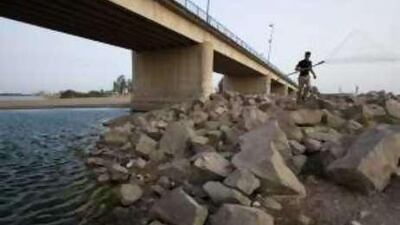RAQQA, Syria // On the terrace of his plush villa, overlooking the Euphrates River, Abu Jasim has lined up four shotguns, a handful of shells and an enormous flashlight, the basic equipment he takes with him on hunting trips. The weapons, he said proudly, are all US-made Remingtons and expensive, with different bores and different barrel lengths to suit whatever he wants to shoot that day. He lists a series of bird species that he prefers to hunt, before noting that it is against the law in Syria to kill any of them.
"Some of these birds have been protected here for 15 years," he said with a smile. "Hunting is illegal." Such prohibitions fail to have much of a deterrent effect, however, and, according to Abu Jasim, who asked not to be fully identified, avoiding the authorities only adds to the challenge of the hunts. "Shooting is noisy and attracts the police, so we have to stay on the move a lot, you can't sit in one place for too long, you have to plan and make sure you have a good exit route," he said.
"There's a lot of empty land out there so it can take some time for the police to come. The bigger problem is informers. There are people who will report on exactly where you are and then the police are quicker." In his early 50s, with a wide mustache and thinning hair, Abu Jasim was caught during one recent expedition in Raqqa governorate, 550km north-east of Damascus, and sentenced to five weeks in prison. To his surprise and disappointment, the authorities insisted he serve every day of the punishment.
"It goes with the territory, it hasn't put me off, I love hunting and I'll keep doing it," he said. Most of Syria's small-game hunters do not shoot to earn a living or poach food to feed their families; instead they tend to be wealthy hobbyists who can afford the guns, ammunition and time to go on long trips. "It's the sport we love, there's nothing better than going out for a week or so with friends, camping out, shooting a bit, avoiding the police," Abu Jasim said. He typically takes his son, who in his early 20s, with him when he goes. "It's a tradition here, my father was a hunter too."
On the shores of nearby Assad Lake, the Syrian government opened the Revolution nature reserve 16 years ago, designed as a haven for animals and plants. Gazelles, all but non-existent in the wild having been hunted for generations, were imported from Turkey in a successful effort to repopulate the area. A handful of small wild cats, known as Euphrates River tigers, continue to live in the reserve, according to officials. The wild cats, once fairly numerous, were rare by the 1940s. Only people with written permission from the governor's office are currently allowed to visit the zone, although that restriction may soon be changed.
"Hunting here is strictly illegal and anyone caught doing it goes to jail," said Saleh Ahmad, the reserve's director. "It doesn't always stop people trying. We have caught hunters. We don't want that kind of thing here. We're planning to make it a place for eco-tourism perhaps, something that isn't harmful." Fishing on the Euphrates is also regulated, prohibited during the spawning season, between March 15 and June 15. But, with limited numbers of environmental protection officers, enforcing the law is difficult, and illegal commercial fishing takes place year-round. Use of electricity, dynamite and poisons by unlicenced fishermen is common.
The result has been an extinction of more than a dozen species of fish and a massive depletion of stocks in more common types. Raqqa, a large, semi-arid zone in Syria's eastern Jazeera region, is a centre for the country's Arab tribal heritage. Although most of the Bedouin have now settled down to become farmers, there is a strong hunting tradition among the tribes. "Almost every house in the countryside has at least one weapon, either a Kalashnikov [assault rifle] or a shotgun for hunting," said a leading tribal sheikh, who asked not to be named.
In Syria's big urban centres, weapons are only permitted for members of the security services. The rural areas work under different informal rules, however. The sheikh admitted that shooting game birds and trapping birds of prey remained common. Falcons are widely prized for hunting in the Arab states, with offices in Damascus selling the birds at a high price, mainly to buyers in Gulf countries. Sitting on the terrace of his villa, Abu Jasim, the hunting enthusiast, admitted Syria's wildlife had suffered because of overhunting and the destruction of natural eco-systems through unregulated development.
"When I was 10 years old, the wild gazelle used to come right up to the terrace here; now you don't see them," he said, looking across the wide Euphrates flood plain. "There are too many people, too much building and the big farms affect them." He insisted his own hunting exploits involved shooting a small number of birds or catching fish with a rod and were not therefore harmful. "At most I'll shoot one or two birds and we eat them, I'm not out there killing hundreds at a time. There's no point in that," he said. "You've got to respect the environment and the animals. My father taught me that. Those fishermen who use generators or dynamite to kill everything in the water, they are ignorant and they are real criminals because they do lasting damage."
@Email:psands@thenational.ae

